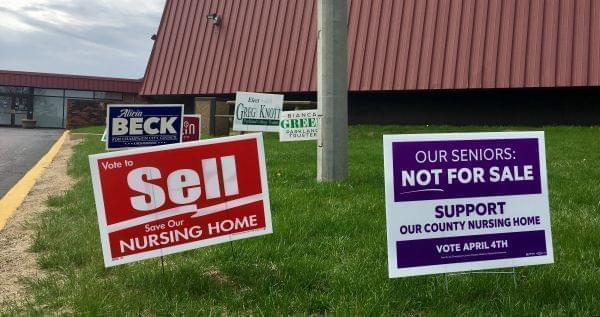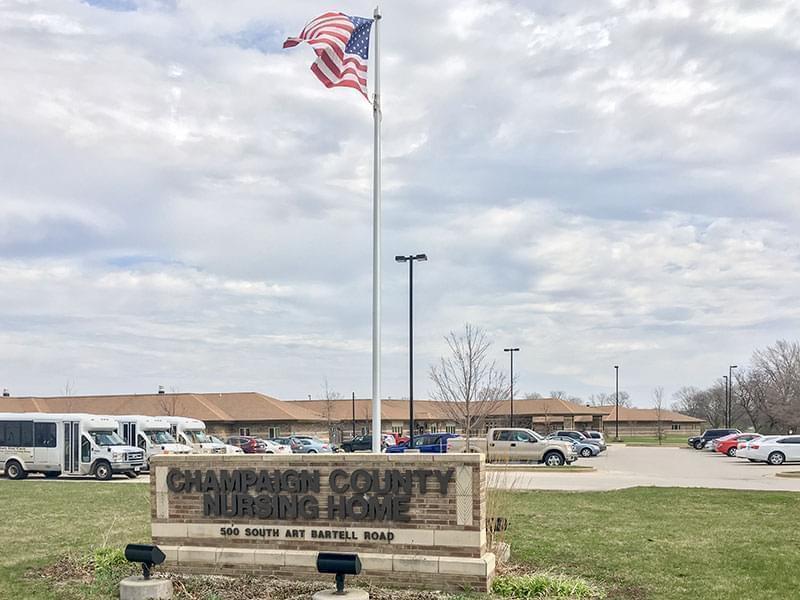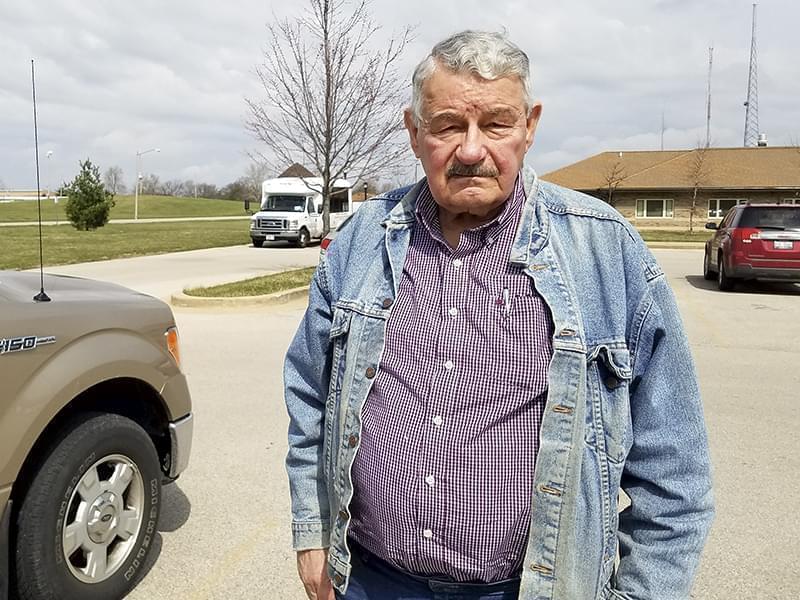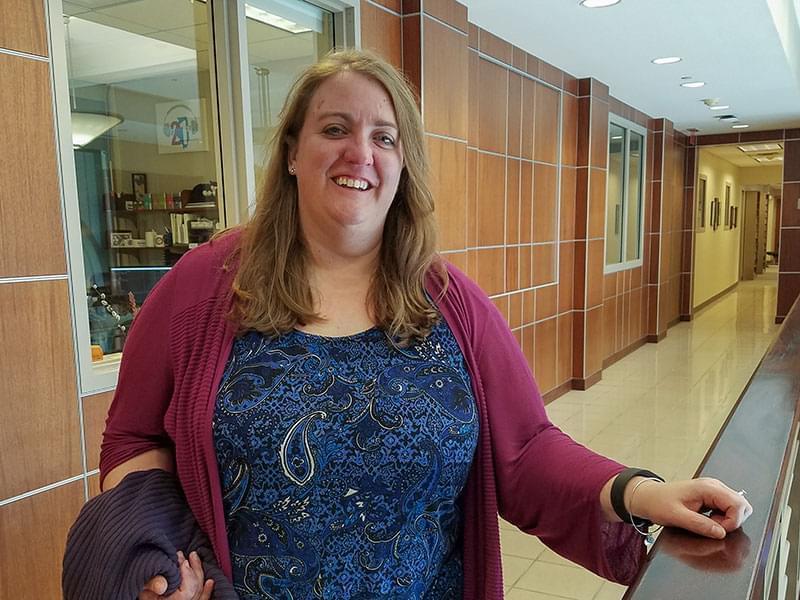Champaign County Voters To Consider Two Futures For Nursing Home

Sign promoting referenda to either allow the sale of, or approve a property tax increase for the Champaign County Nursing Home are displayed side by side outside a polling place at the county's Brookens Administrative Center in Urbana. Scott Cameron / Illinois Public Media
The Champaign County Nursing Home is on the ballot again. Voters are being asked to decide two different options on the April 4th ballot about the county-run nursing home --- whether or not to raise property taxes to fund it, and whether or not to give the county board permission to sell or dispose of it. Both proposals have their advocates, and the advocates for both sides say theirs is the best way to ensure the nursing home’s continued existence.
The proposed tax increase would roughly triple the special property tax for the nursing home that voters approved in 2002. Currently, the nursing home received funding from a tax of 3.25 cents per $100 assessed valuation. Passage of the April 4th tax referendum would raise that rate to ten cents. Under the current tax, the owner of a $150,000 home in Champaign County pays approximately $16.25 a year to support the county nursing home. The proposed increase would raise that to $50 a year. Supporters estimate that the increased tax levy will raise about $12 million over the course of a decade.

Champaign County Nursing Home in Urbana
Meanwhile, a second referendum on the ballot asks Champaign County voters if they want to allow the county board to “sell or dispose of” the nursing home. The referendum does not mandate the sale of the nursing home, but allows the county board to consider the idea. Voters could approve one or both or neither of the two questions. But if the tax question passes, it will go into effect automatically, while the sale question just provides the county board with another option that it may or may not act upon.
The Champaign County website has a guide to the nursing home referendums here.
Laker: View From A Husband Of A Nursing Home Resident

David Laker
A tax increase is an added cost that David Laker of Philo is ready to pay. The retired designer and instrument-maker supports the proposed property tax referendum for the nursing home, and has done volunteer work for Champaign County Citizens Allied For Residents' Eldercare, or Champaign County CARE, a group working for its passage.
Laker visits his wife, Sue, at the Champaign County Nursing Home daily. She suffers from early-onset Alzheimer’s and has been at the nursing home for three years. Laker says he considered other facilities for his wife, including the county-operated nursing home at Monticello, in Piatt County. But he says he likes the Champaign County Nursing Home because it’s closer, and is equipped to care for people with dementia. And he says the nursing home has a caring staff.
“That’s the thing I like about this nursing home,” said Laker. “We’ve got a lot of long-term employees, some of them 16, 20 years’ service, and they actually do care. And they like what they do, they like working with people, and they go the extra mile for the people.”
Laker believes that continuing county ownership for the nursing home is essential to continue its quality of care, and that quality could decline if the home was sold to a private operator. But not everyone with loved ones in the nursing home agrees.
Tapley: Sell The Nursing Home To Ensure Its Survival

Scott Tapley
Scott Tapley is the organizer of a group called “Save Champaign County Nursing Home: Vote To Sell.” The banker who lives in Savoy says his group also includes people with family members in the nursing home. But Tapley says a person’s good or bad experience with the nursing home is not necessarily the reason for their decision. Instead, he says it’s their beliefs about who would do the best job of running the facility in the future --- the government or a private operator. And for Tapley, Champaign County government is not doing the best job.
“I was on the Champaign County board in 2002,” says Tapley, who was a Republican member of the county board from 1998 to 2007, “when the first referenda were put on the ballot for a property tax subsidy and to pay for a new building. I argued at the time that the subsidy wouldn’t be enough and that no subsidy would be enough to keep it from losing money every year, like it had been doing before 2002. And I’ve been proven correct.”
Tapley is a longtime anti-tax advocate, who campaigned in the 1990’s for the property tax caps that Champaign County currently has. But he says his opposition to county ownership of the nursing home is based on years of measures taken to help the nursing home that were supposed to provide smooth sailing. Those include the initial 2002 nursing home property tax, the construction of a new nursing home building, the establishment of a nursing home advisory board, the hiring of an outside firm to run the nursing home, the loaning of nearly $1 million in county money to keep the nursing home operating, and --- just this month --- another loan by the county of $250,000 to help the nursing home through a cash-flow problem caused by delays in Medicaid funding and the slow processing of Medicaid applications. (The cash-flow problem prompted then-County Board Chair Pattsi Petrie to warn Gov. Bruce Rauner in a letter last October that the nursing home could close if it wasn't addressed).
Plus, Tapley points to recent problems with the quality of care at the nursing home, as shown in recent low rankings by the federal Center for Medicare and Medicaid and ongoing complaints about the nursing home’s food service, as evidence of other problems he blames on the county’s ownership.
But the problems that Tapley blames on the county are those that its supporters believe the county can fix, as long as the nursing home is adequately funded.
Fortado: Selling The Nursing Home Is Too Risky

Stephanie Fortado
Stephanie Fortado is one of those supporters. Unlike David Laker, the lecturer with the University of Illinois’ School of Labor and Employment Relations does not have a loved one in the nursing home. But she thinks the facility is important enough that she’s been volunteering her time with Champaign County CARE. That group has been advocating for the nursing home property tax referendum with yard signs that say “Our Seniors: Not For Sale.” That slogan refers to the group’s fears that the “sell or dispose” referendum could threaten the quality, and even the existence of the nursing home.
“I think it’s really important to note how open ended that proposal is”, said Fortado. “All that you’d be voting on is selling it or disposing it. It doesn’t say for sure what would happen. And I don’t think that is a risk the community should take, that we should give permission to consider disposing of this facility that has been important to so many families in our community for a century.”
The century time-span refers to the Champaign County Nursing Home’s origins in the old county poor farm.
Emanuel: County Is The Best Operator, If Funding Is Adequate

Cathy Emanuel
Another supporter, Cathy Emanuel, says the county can fix the nursing home’s problems, as long as the nursing home is adequately funded.
Emmanuel is a member, and past chair, of the Champaign County Nursing Home Advisory Board. The retired hospital executive says she initially came to the board thinking that it might be time to place the nursing home in private hands. Instead, she now believes that county ownership is best.
“I have come to that because the kinds of programs that are available at the Champaign County Nursing Home, that don’t exist at other nursing homes in the community, are there to a great extent because it is community-based,” said Emanuel.
Those services include the Adult Day Center for people suffering from demential, and on-site dental and optometry care for residents.
Emanuel says the county nursing home also houses a sizable percentage of nursing home residents in Champaign County who are on Medicaid, which is one reason why the state’s delay on Medicaid payments and applications is such a serious matter for the facility. About two-thirds of the home’s residents are funded by Medicaid, which is more than in the average private facility. Plus, Emanuel says the fact that the county nursing home is the biggest in Champaign County means that it serves more Medicaid residents than any other nearby facility.
Tapley: Private Operator Inherently Better
But Tapley believes a private operator would do a better job with the nursing home than the county, and even serve more residents on Medicaid. He says that while it has the highest capacity of any nursing home in Champaign County, the facility has dozens of empty beds.
“If the new buyer for the nursing home fills the beds to capacity, which the Champaign County Board has been unable to do for 15 years, and even if the census of Medicaid patients dropped from the current 67 percent to the state average of 55 percent, the number of Medicaid beds served would actually go up,” said Tapley.
Tapley also believes a private operator would be more stable financially, in part because many private nursing home operators own chains of facilities that enjoy economies of scale. But Emanuel says the Champaign County Nursing Home was actually in a good financial position until recently.
“For the last six out of the last seven years, the nursing home had a positive cash flow,” said Emanuel. “But it wasn’t creating enough revenue to fund depreciation, to take care of deferred maintenance and some capitol needs that we’ll see in the future."
Emanuel says a property tax increase would permit the nursing home to weather the current problem with Medicaid. Then, she says the nursing home could begin to pay money it owes its vendors, pay back money it owes to the county, and pay for deferred maintenance on the ten-year-old nursing home building. After that, there could be funding available for future, unspecified improvements to the building.
Anderson: Nursing Home Shows The Limits Of Government
The proposed tax increase for the nursing home was brought up by the Advisory Board. But not all members support the idea. Advisory Board Chairman Jack Anderson is one of the liaisons between the advisory board and the Champaign County Board. (The other liason is Democrat Josh Hartke, who supports the nursing home tax referendum). The Rantoul Republican says he will follow whatever the voters decide to do. But personally, he agrees with Tapley that the nursing home would do better in private hands.
“I don’t think government does many things well. It certainly is mandated to do certain functions,” said Anderson. But he says that governments have more difficulty performing other functions for which expertise is harder to come by, and believes that includes the county nursing home. Anderson also believe the nursing home’s unionized work force adds an extra expense that private nursing homes in the area don’t have.
Everybody: The Dangers Of Status Quo
With two nursing home referenda on the April 4th ballot, the two opposing sides each want their referendum to pass and the other to be defeated. It’s possible that both referenda could pass -- although only the tax referenda would automatically take effect.
Another possibility is that voters could reject both the tax question and the proposal to allow the Champaign County Board sell or dispose of the nursing home. That would leave the county board with few options to handle the nursing home’s financial difficulties.
Champaign County Administrator Rick Snider says under those conditions, he would be forced to downsize the nursing home to a size the county could afford to operate. Space at other nursing homes would have to be found for many of the county nursing home’s residents, and staff would have to be laid off.
Supporters of both the tax hike and sale to a private operator say a “no” on both questions would be the Champaign County Nursing Home’s worst-case scenario.
NOTE: This story has been revised to add additional material, including links to online resources about the nursing home referendums. - JM 3/31/17
Links
- Raise Taxes For Champaign County Nursing Home Or Sell It? This Man Says Sell
- Coming To Champaign County April Ballot: Referendums To Sell And Raise Taxes For Nursing Home
- Champaign County Board To Consider Choices For Nursing Home’s Future
- County Board Wants More Info Before Deciding On Nursing Home Tax Hike
- Tax Increase Proposed For Champaign County Nursing Home
- Guide to nursing home referendums on Champaign Co website.
- Champaign County CARE website
- Save CCNH: Vote To Sell Facebook page
- Champaign County Nursing Home website

